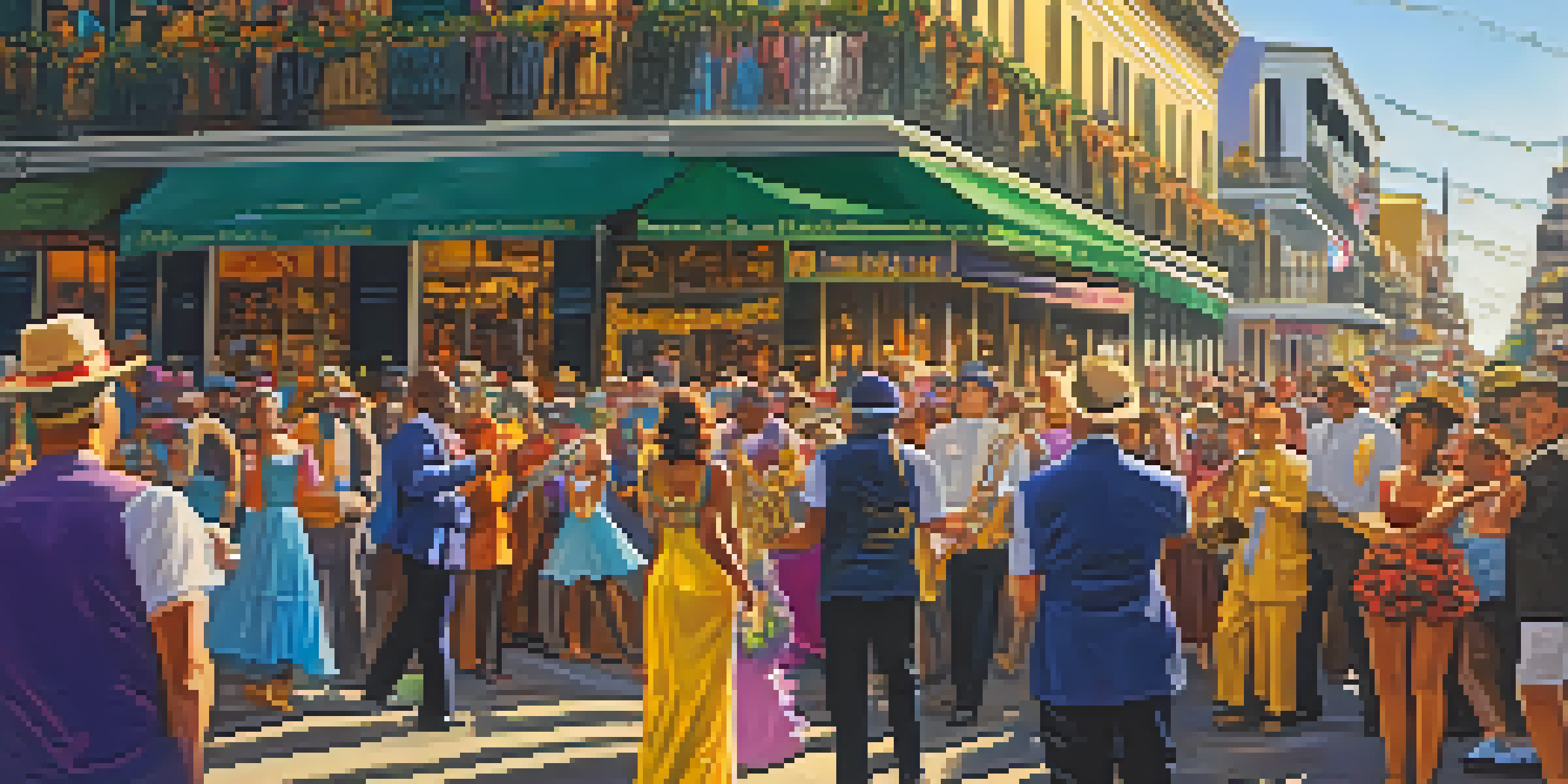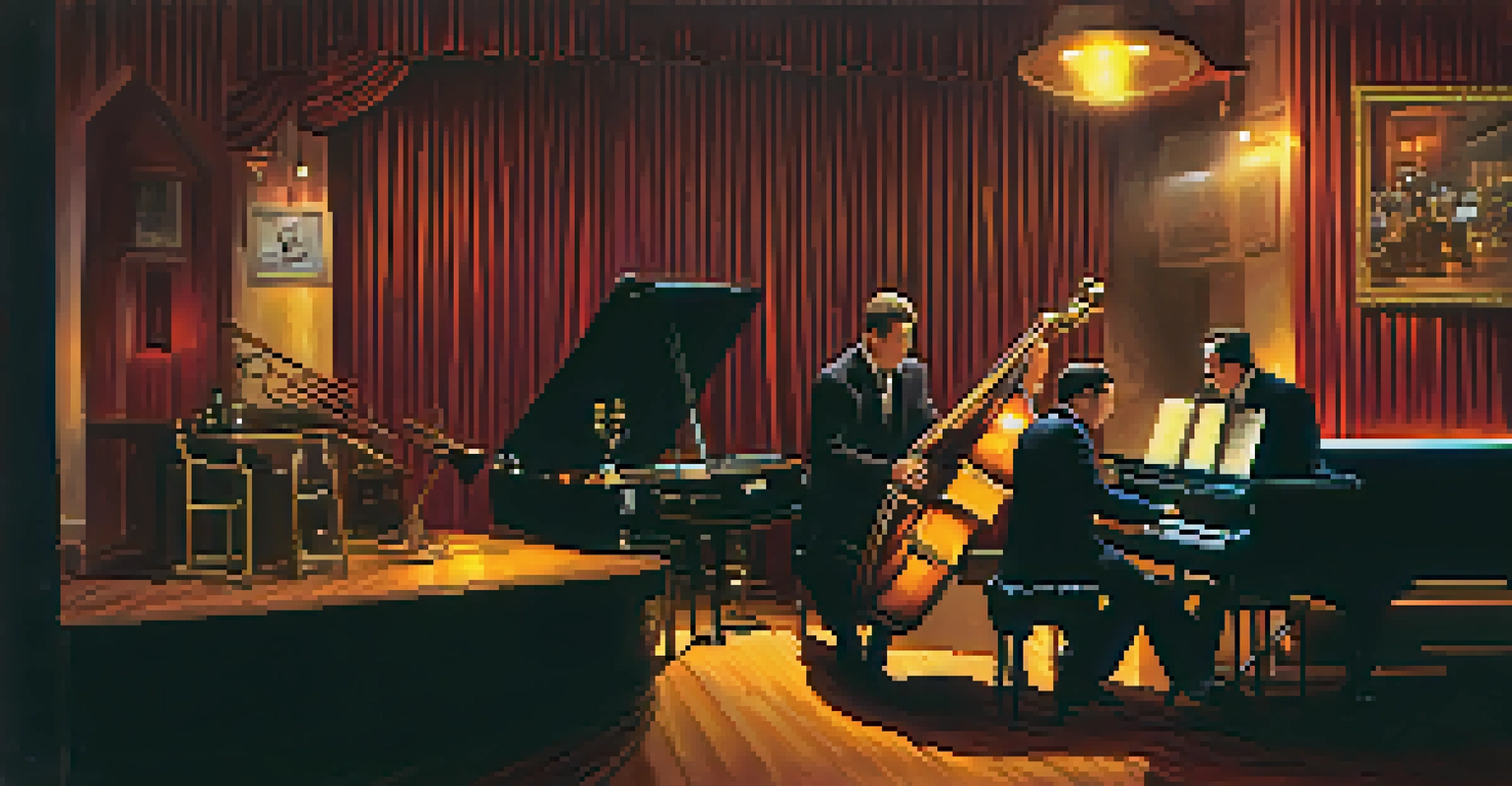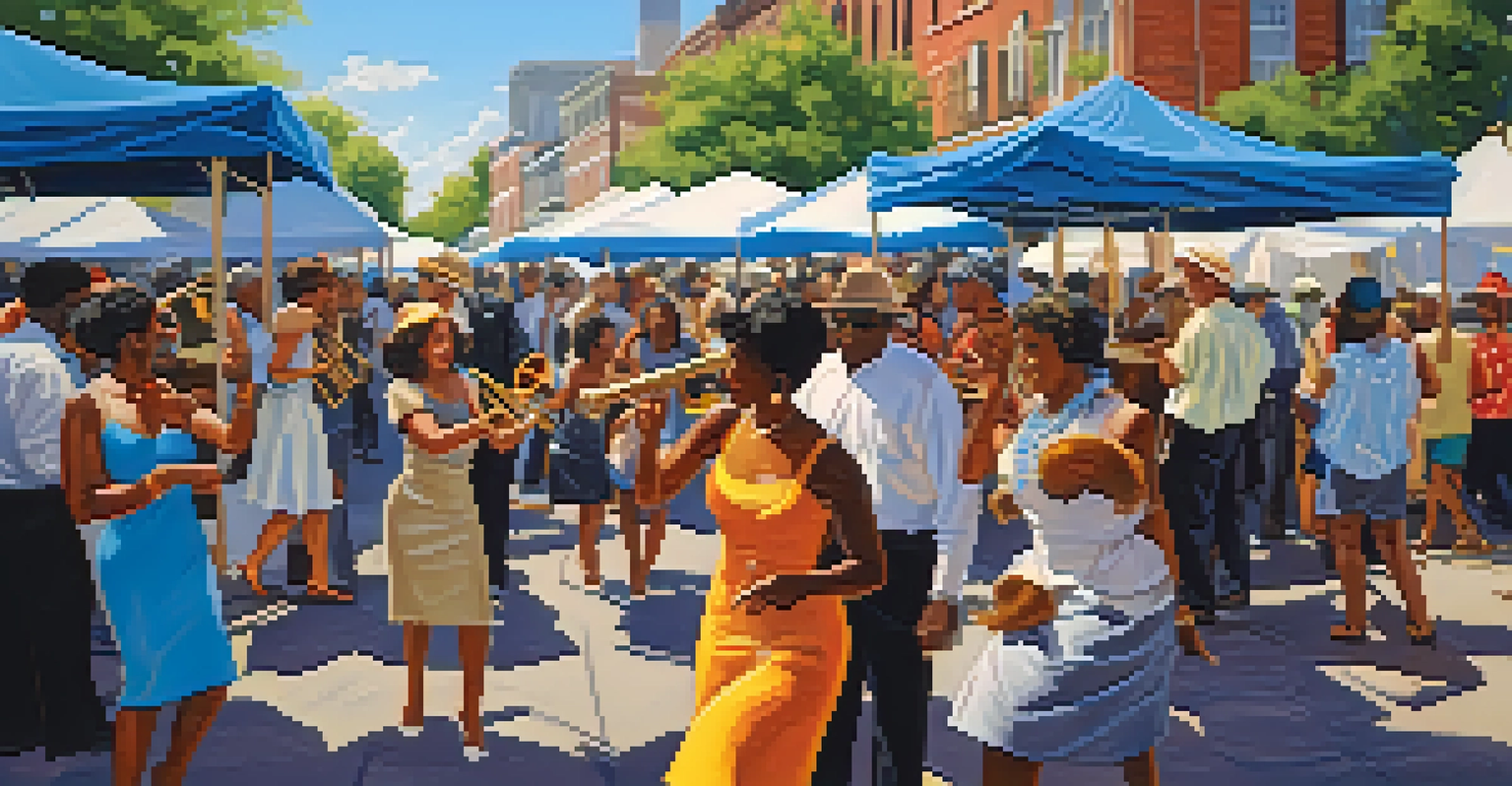The Role of New Orleans in the Birth of Jazz Music History

The Birthplace of Jazz: New Orleans' Unique Culture
New Orleans is often celebrated as the birthplace of jazz music, a genre that emerged in the early 20th century. The city's rich cultural tapestry, influenced by African, French, Spanish, and Creole traditions, created an ideal environment for musical innovation. This blend fostered a spirit of creativity and experimentation that was crucial to the development of jazz. With its vibrant nightlife and street performances, New Orleans became a hub where musicians could express themselves freely.
Jazz is the only music in which the same note can be played night after night but differently each time.
The city's unique social landscape also played a crucial role in jazz's emergence. In the early 1900s, African American communities in New Orleans were creating their own musical styles, drawing from blues, ragtime, and marching band music. This cultural melting pot allowed for diverse musical influences to coalesce, leading to the distinctive sound that defines jazz. The local parades and celebrations further encouraged improvisation, a core aspect of jazz music.
Additionally, the presence of iconic venues like Storyville, the city's famed red-light district, nurtured a lively music scene. Here, musicians could showcase their talents to enthusiastic audiences, with the sounds of trumpets and clarinets filling the air. This environment not only helped to hone the skills of emerging artists but also solidified New Orleans as a pivotal place for jazz's birth and growth.
Key Figures in New Orleans Jazz History
Several legendary musicians emerged from New Orleans, each contributing to the evolution of jazz. Louis Armstrong, often regarded as one of the most influential figures in jazz history, began his career in New Orleans, where he developed his signature trumpet style and vocal technique. His innovative approach to music and improvisation captivated audiences and helped to popularize jazz across the United States.

Another prominent figure is Jelly Roll Morton, a pianist and composer who claimed to have invented jazz. Morton blended ragtime, blues, and traditional jazz elements, showcasing the versatility of the genre. His recordings in the 1920s highlighted New Orleans jazz's rhythmic complexity and emotional depth, influencing countless musicians who followed.
Jazz's Roots in New Orleans Culture
New Orleans' diverse cultural influences created an ideal environment for the birth and evolution of jazz music.
Moreover, the impact of local musicians extended beyond the traditional boundaries of jazz. Artists like Sidney Bechet, an early saxophone virtuoso, brought the New Orleans sound to a wider audience, performing in cities like Paris and helping to establish jazz as a global phenomenon. These musicians not only shaped jazz but also laid the groundwork for future generations, demonstrating the lasting legacy of New Orleans in music history.
The Influence of African American Culture on Jazz
The roots of jazz are deeply entwined with African American culture, and New Orleans served as a vital conduit for this musical expression. The African traditions of call-and-response, rhythmic complexity, and improvisation were integral to the development of jazz. These elements emerged from the rich history of African musical practices, which were brought to the city by enslaved people and evolved over generations.
If you have to ask what jazz is, you'll never know.
Spirituals and work songs also contributed to the formation of jazz, reflecting the struggles and stories of African Americans. In New Orleans, these musical styles intertwined with the city's diverse influences, creating a unique sound that resonated with both the local community and beyond. The emotional depth conveyed in these songs laid the groundwork for jazz's expressive capabilities.
Furthermore, the social gatherings and communal events in African American neighborhoods provided a platform for musicians to collaborate and innovate. These gatherings often featured spontaneous performances, where musicians would engage in a musical dialogue, further developing the improvisational aspect of jazz. This cultural exchange solidified New Orleans as a breeding ground for jazz, showcasing the vital role of African American culture in its history.
The Impact of Creole and Cajun Music on Jazz
New Orleans' Creole and Cajun cultures significantly influenced the development of jazz music. The Creole community, known for its rich musical traditions, blended African, European, and Caribbean elements, creating a distinctive sound that enriched jazz. Instruments like the accordion and fiddle, commonly used in Cajun music, introduced new melodies and rhythms, which jazz musicians adopted and adapted.
Moreover, the vibrant dance halls and social clubs in New Orleans provided a stage for Creole and Cajun musicians to showcase their talents. These venues fostered collaboration among musicians from different backgrounds, allowing for the exchange of musical ideas. Many jazz musicians drew inspiration from the lively two-step dances and folk tunes prevalent in these communities, further enhancing the genre's diversity.
Influential Jazz Musicians
Legendary musicians like Louis Armstrong and Jelly Roll Morton emerged from New Orleans, shaping the sound and popularity of jazz.
The cross-pollination of musical styles contributed to the evolution of jazz, making it a truly American art form. As jazz spread beyond New Orleans, these influences continued to shape the genre, leading to various subgenres that we recognize today. The legacy of Creole and Cajun music remains an essential part of jazz history, highlighting the importance of cultural exchange in its development.
Jazz and the Cultural Landscape of New Orleans
Jazz music is woven into the very fabric of New Orleans' cultural landscape. From lively street performances during Mardi Gras to the iconic jazz funerals, the genre is a core part of the city's identity. These events not only celebrate the music but also honor the traditions and histories of the communities that created it, showcasing the profound connection between jazz and New Orleans culture.
The annual New Orleans Jazz & Heritage Festival is a prime example of how the city celebrates its musical legacy. This festival attracts music lovers from around the world, offering a platform for both iconic jazz musicians and emerging artists. The event highlights the diversity of New Orleans' music scene, showcasing genres like blues, gospel, and R&B, further illustrating the interconnectedness of these musical styles.
Additionally, jazz has become synonymous with New Orleans' tourism industry, drawing visitors eager to experience the city's vibrant music scene. Jazz clubs, such as the famous Preservation Hall, continue to keep the spirit of traditional jazz alive, while also providing a space for contemporary musicians to innovate. This cultural exchange reinforces New Orleans' status as a global hub for jazz, ensuring that its influence endures.
The Evolution of Jazz Styles in New Orleans
As jazz music evolved, New Orleans remained a central hub for various styles, each reflecting the city's dynamic cultural environment. Early jazz, characterized by collective improvisation and a lively rhythm, laid the groundwork for later developments. This style, often referred to as Dixieland, featured ensembles playing together, creating a joyful and spontaneous sound that resonated with audiences.
As the years progressed, new styles emerged from the New Orleans jazz scene. The development of swing in the 1930s brought a more structured and danceable rhythm, while bebop in the 1940s introduced complex melodies and harmonies. Musicians like Charlie Parker and Dizzy Gillespie, though not exclusively New Orleans natives, were greatly influenced by the city's early jazz, showcasing its lasting impact on the genre's evolution.
Preserving Jazz Heritage
Efforts to educate and promote jazz ensure that the rich traditions of New Orleans music continue to thrive for future generations.
Today, the legacy of New Orleans jazz continues to inspire contemporary musicians across the globe. Genres such as funk, soul, and even hip-hop draw from the improvisational spirit and rhythmic complexity rooted in jazz. This ongoing evolution highlights how New Orleans remains a vital source of musical innovation, ensuring that the city's influence on jazz history endures for generations to come.
Preserving the Legacy of New Orleans Jazz
Preserving the legacy of New Orleans jazz is a crucial endeavor for the city's musicians and cultural organizations. Efforts such as educational programs and community initiatives aim to pass down the rich traditions of jazz to younger generations. Organizations like the Jazz and Heritage Foundation work tirelessly to promote and support local artists, ensuring that the sounds of New Orleans continue to thrive.
Jazz education is increasingly integrated into schools and community centers, providing students with opportunities to learn about the genre's history and techniques. Programs that connect young musicians with experienced mentors help cultivate talent and foster a deeper appreciation for jazz. These initiatives play a vital role in keeping the spirit of New Orleans jazz alive, nurturing a new generation of artists.

Moreover, the city hosts various jazz festivals and competitions that celebrate the genre's heritage while encouraging innovation. Events like the New Orleans Jazz & Heritage Festival not only showcase established musicians but also provide a platform for emerging artists to make their mark. This dedication to preserving and promoting jazz ensures that New Orleans remains a vibrant center for this iconic musical genre.